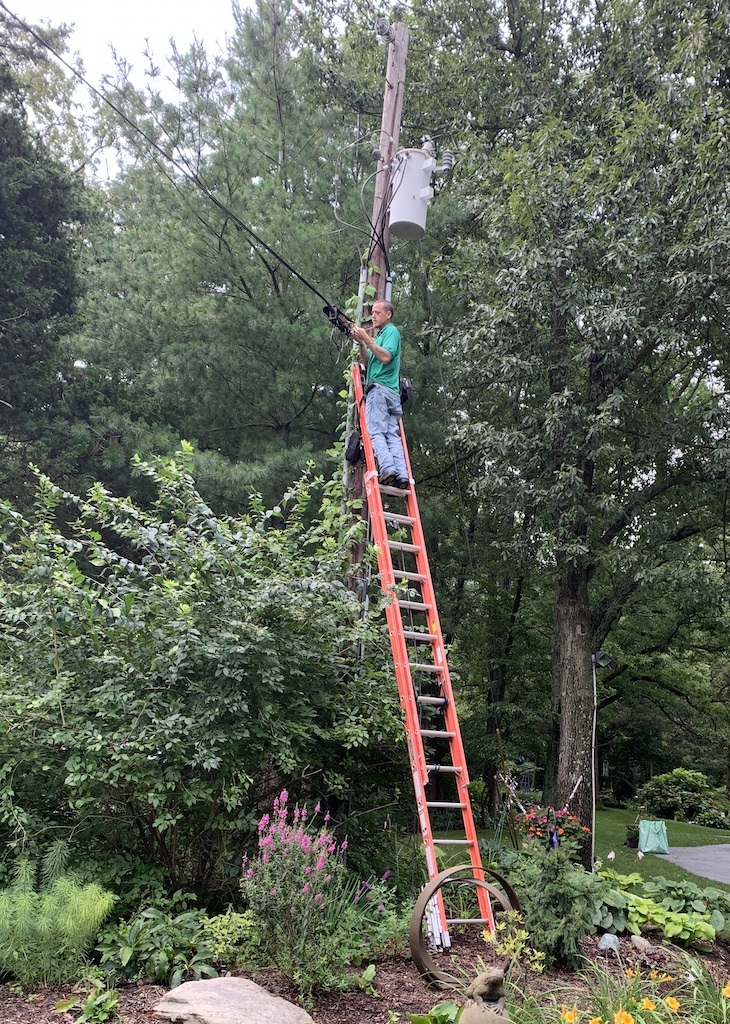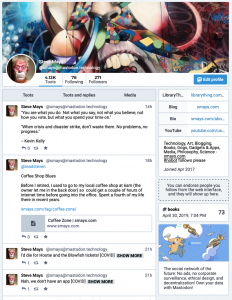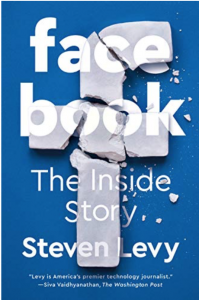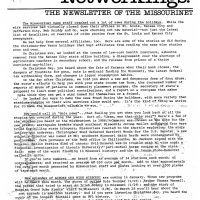Hugs and kisses (virtual) for the CenturyLink tech that found and fixed the problem with our DSL. Be a while before I take even so-so internet access for granted.

Category Archives: Internet
“A stream of wisecracks”
“Blogging is akin to stand-up comedy — it’s not coherent drama, it’s a stream of wisecracks. It’s also like street art — just sort of there, stuck in the by-way, begging attention, then crumbling rapidly.”
Do not forward
 I’ve been thinking of this Time of Quarantine as a sort of silent retreat. A time for quiet reflection. Only I haven’t been that silent. I’ve been sharing stuff I find online, usually via iMessage. I’m going to try to do less of that. One, there’s a good chance you’ve already seen it and, two, who need one more interruption. What’s the old saying? “If I want any shit out of you I’ll squeeze your head.” I could post random thoughts, observations and links here but it would feel like clutter.
I’ve been thinking of this Time of Quarantine as a sort of silent retreat. A time for quiet reflection. Only I haven’t been that silent. I’ve been sharing stuff I find online, usually via iMessage. I’m going to try to do less of that. One, there’s a good chance you’ve already seen it and, two, who need one more interruption. What’s the old saying? “If I want any shit out of you I’ll squeeze your head.” I could post random thoughts, observations and links here but it would feel like clutter.
Which brings me to Mastodon. It’s a little like Twitter… without all the assholes. I have complete control of whose posts (they call them “toots”) I see and who sees what I post. If a bad actor shows up, they’re warned to behave and booted if they don’t.
This is an experiment. I might not be able to resist IM’ing some of my contacts. But I’m going to try. And, no, you don’t have to create a Mastodon account to see my toots (cute, no?). You can bookmark this link.
Facebook: The Inside Story
 I’m at a loss for what to say about Steven Levy’s book, Facebook: The Inside Story. At 500 pages it’s a deep dive into the history of Facebook (the startup and all that’s happened since). The excerpts below are just a few of the things that caught my eye. It would be a mistake to judge the book (or Mark Zuckerberg) based on the passages I underlined.
I’m at a loss for what to say about Steven Levy’s book, Facebook: The Inside Story. At 500 pages it’s a deep dive into the history of Facebook (the startup and all that’s happened since). The excerpts below are just a few of the things that caught my eye. It would be a mistake to judge the book (or Mark Zuckerberg) based on the passages I underlined.
Soley by analyzing Likes, they successfully determined whether someone was straight or gay 88 percent of the time. In nineteen out of twenty cases, they could figure out whether one was white or African American. And they were 85 percent correct in guessing one’s political party. Even by clicking innocuous subjects, people were stripping themselves naked. […] In subsequent months,Kosinski and Stillwell would improve their prediction methods and publish a paper that claimed that using Likes alone, a researcher could know someone better than the people who worked with, grew up with, or even married that person. “Computer models need 10, 70, 150, and 300 Likes, respectively, to outperform an average work colleague, cohabitant or friend, family member, and spouse.”
A 2012 study found that Facebook was mentioned in a third of divorces.
It was a natural evolution to put (content moderators) in factories. They became the equivalent of digital janitors, cleaning up the News Feed like the shadow workforce that comes at night and sweeps the floors when the truly valued employees are home sleeping. Not a nice picture. And this kind of cleaning could be harrowing, with daily exposure to rapes, illegal surgery, and endless images of genitals.
Between January and March 2019, (Facebook) blocked 2 billion attempts to open fake accounts — almost as many as actual users on the system. […] The company concedes that around 5 percent of active accounts are fake. That’s well over 100 million.
It’s left to the 15,000 or so content moderators to actually determine what stuff crosses the line, forty seconds at a time. In Phoenix (site of one of the moderator “factories”) I asked the moderators I was interviewing whether they felt that artificial intelligence could ever do their jobs. The room burst out in laughter.
A computer-science teacher at one of the big AI schools told me that Facebook used to be the top employment choice. Now he guesses that about 30 percent of his students won’t consider it, for moral reasons.
“We’ve actually built an AI that’s more powerful than the human mind and we hid it from all of society by calling it something else,” Harris says. “By calling it the Facebook News Feed, no one noticed that we’d actually built an AI that’s completely run loose and out of control.” Harris says that using the News Feed is like fighting an unbeatable computer chess player—it knows your weaknesses and beats you every time.” — Tristan Harris (former Google interface engineer)
A few take-aways:
- Facebook might be the most powerful (influential) organization in the world. And therefore — potentially — the most dangerous.
- Everyone on the planet is affected by what Facebook does (or doesn’t do). Even those of us without accounts.
- Mark Zuckerberg is brilliant and has surrounded himself with other brilliant people. He seems to believe he is always the smartest person in the room.
- Zuckerberg is on a mission to save/change the world. Combined with the above, this makes him very dangerous.
- People who use Facebook (and those of us who do not) have no idea the extent to which we are influenced by the people running the platform.
- Users will never —voluntarily — stop using Facebook.
The book has left me a bit shaken. I always considered religion — some religion — the greatest danger to humanity. Facebook seems a greater threat.
Tags and Categories
A little history. I was keeping notes in a journal long before I got my first computer (1984). When I came across a good quote in a book or a line in a movie, I’d jot it down in a spiral bound notebook with the idea I could find it later. Only way to do that, however, was to page through all of the notebooks. When I got my first computer I tried making notes in a text file which was searchable but just barely.
In the late 90’s I used Microsoft FrontPage to create a “personal home page” where I parked some of this stuff. (My tagline was: “I’ve really got to start writing some of this down”) Hardly an improvement over my notebooks but I was naive enough to think someone might want to read what I wrote. I put the new stuff at the top of the page and pushed the older notes down.
As blogging software and platforms came along, I tried most of them. Radio Userland, Blogger, TypePad, Posterous and — eventually — WordPress. I don’t recall when I first encountered the concept of tagging my posts but it wasn’t until I started using WordPress that I got serious about metadata. Why I tag and how I tag in a moment, first let’s talk about categories. Continue reading
Newsletters
 I try not to long for “the way things used to be,” but it’s difficult. Newsletters, for example. In the late 80’s we sent a monthly newsletter to affiliated radio stations. One page, front and back. Typed, photocopied and mailed (took 4 days to reach some stations). Because the space was limited, one gave thought to what to put in and what to omit.
I try not to long for “the way things used to be,” but it’s difficult. Newsletters, for example. In the late 80’s we sent a monthly newsletter to affiliated radio stations. One page, front and back. Typed, photocopied and mailed (took 4 days to reach some stations). Because the space was limited, one gave thought to what to put in and what to omit.
Facebook and Twitter accounts replaced newsletters long ago. That’s not right. Email replaced printed newsletters. So little thought goes into what we “share” these days, why bother?
The Spinner*
“The Spinner* (with the asterisk) is “a service that enables you to subconsciously influence a specific person, by controlling the content on the websites he or she usually visits.” Meaning you can hire The Spinner* to hack another person.”
“You pay The Spinner* $29 (and the company) provides you with an ordinary link you then text to your friend. When that friend clicks on the link, they get a tracking cookie that works as a bulls-eye for The Spinner* to hit with 10 different articles written specifically to influence that friend. He or she “will be strategically bombarded with articles and media tailored to him or her.” Specifically, 180 of these things.”
Facebook: Where friendships go to never quite die
“(Facebook) has created an entirely new category of relationship — the vestigial friendship. It’s the one you’ve evolved out of, the one that would normally have faded out of your life, but which, thanks to Facebook, is instead still hanging around.”
“Having many Facebook friends, then, is kind of like having a big old encyclopedia. Most of the time it’s just gathering dust on a shelf but you keep it around anyway, because one day you might need it.”
Team Human
 Excerpts from Team Human by Douglas Rushkoff.
Excerpts from Team Human by Douglas Rushkoff.
There’s a reason for our current predicament: an anti-human agenda embedded in our technology, our markets, and our major cultural institutions, from education and religion to civics and media.
Thinking, feeling, connected people undermine the institutions that would control them. […] Our institutions and technologies aren’t designed to extend our human nature, but to mitigate and repress it.
It doesn’t take much to tilt a healthy social landscape toward an individualist or repressive one. A scarcity of resources, a hostile neighboring tribe, a warlord looking for power, and elite seeking to maintain its authority, or a corporation pursuing a monopoly all foster antisocial environments and behaviors. Continue reading
Blogging coming back in style?
David Heinemeier Hansson (creator of Ruby on Rails, Founder & CTO at Basecamp) is leaving Medium for… a WordPress blog.
“Writing for us is not a business, in any direct sense of the word. We write because we have something to say, not to make money off page views, advertisements, or subscriptions.”
“Beyond that, though, we’ve grown ever more aware of the problems with centralizing the internet. Traditional blogs might have swung out of favor, as we all discovered the benefits of social media and aggregating platforms, but we think they’re about to swing back in style, as we all discover the real costs and problems brought by such centralization.”
“With the new take, we’re also trying to bring more of a classic SvN style back to the site. Not just big, marque pieces, but lots of smaller observations, quotes, links, and other posts as well. In fact, the intention is to lessen our dependency on Twitter too, and simply turn Signal v Noise into the independent home for all our thoughts and ideas – big or small.”
I’ve been seeing articles (posts?) on Medium for six or seven years but never paid much attention. Here’s the Wikipedia page. Mr. Hansson’s post reads like Dave Winer from the early days of blogging.
